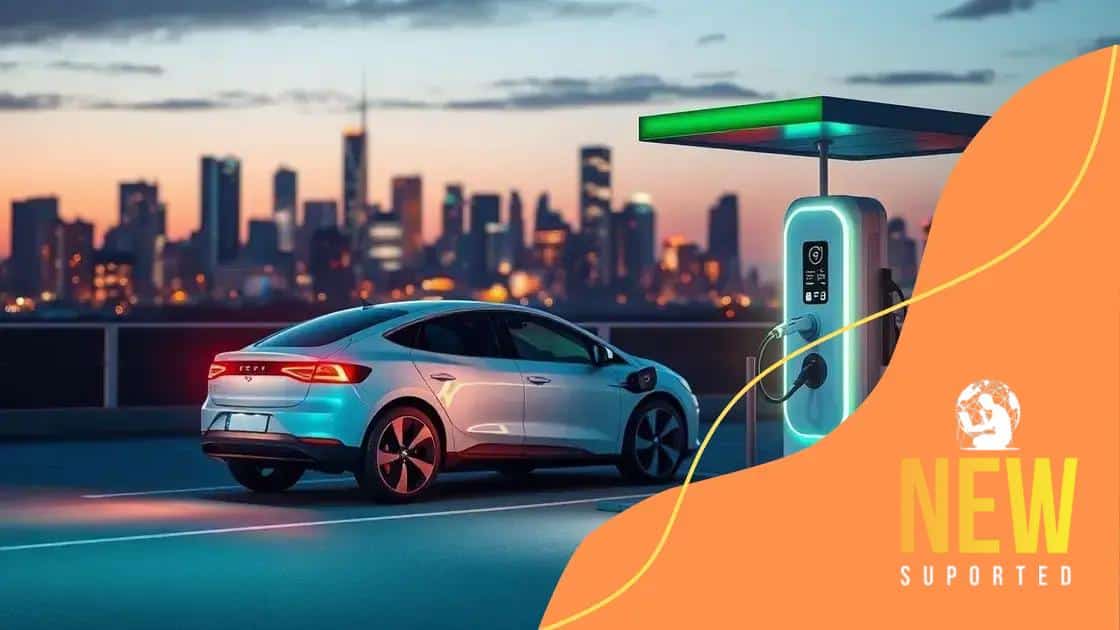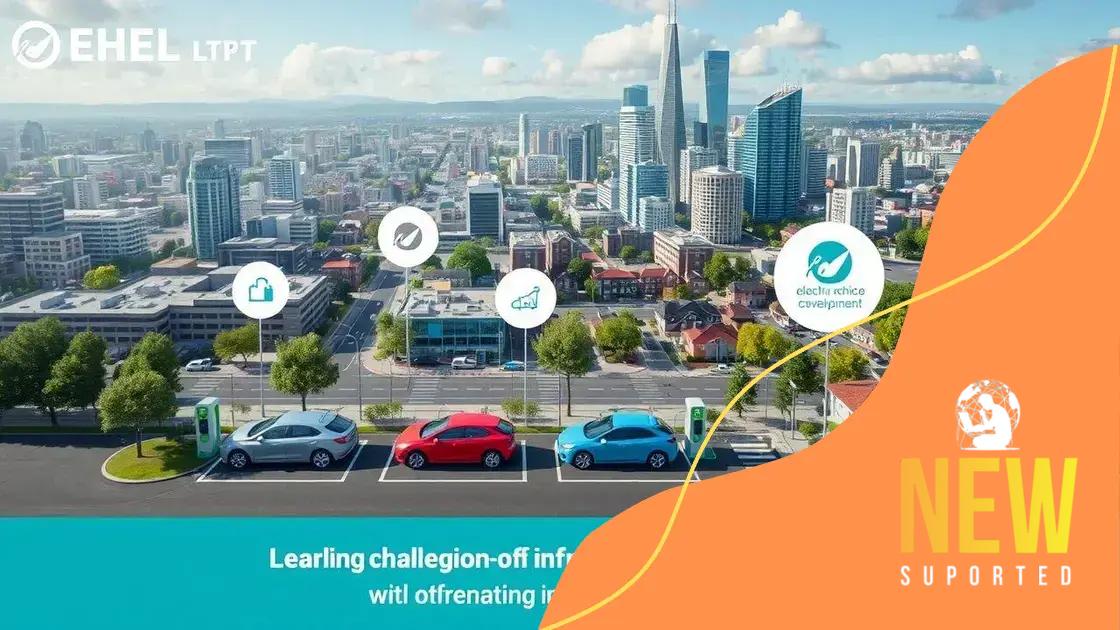How electric vehicle adoption is reshaping the auto industry

How electric vehicle adoption is reshaping the auto industry involves significant changes in consumer preferences, technological advancements, and a growing emphasis on sustainable practices among traditional manufacturers.
How electric vehicle adoption is reshaping the auto industry is a question on many minds today. As more consumers consider EVs, it’s fascinating to explore the ripple effects on the broader market. What does this mean for your next car purchase?
The growth of electric vehicle sales
The growth of electric vehicle sales has been remarkable in recent years. As more consumers become aware of environmental issues and seek sustainable solutions, electric vehicles (EVs) have gained traction. This trend is reshaping the auto industry and attracting interest from a wider audience.
Key Factors Driving Growth
Several factors contribute to the rise in electric vehicle sales. Innovations in battery technology have improved range and charging times. Moreover, incentives from governments worldwide encourage buyers to choose EVs over traditional vehicles.
- Government incentives and subsidies.
- Improvements in battery life and charging infrastructure.
- Growing concerns about climate change.
- Increased availability of EV models.
Even major automakers are pivoting to electric options. This shift is evident as car manufacturers, like Ford and GM, announce plans to expand their electric offerings. In addition to this, consumer preferences are progressively favoring EVs.
Market Trends
The market for electric vehicles is evolving rapidly. Many consumers are now prioritizing performance, safety, and efficiency. The demand for electric SUVs and trucks is increasing, which helps broaden the appeal of EVs across different demographics.
As charging networks expand, the concerns about access will diminish. This accessibility is crucial in turning skeptics into buyers. With advancements in technology, the future of electric vehicle sales looks promising, ultimately influencing auto industry strategies globally.
Impact on traditional car manufacturers
The impact of electric vehicles on traditional car manufacturers is profound. As electric vehicles gain popularity, many longstanding automakers are being forced to rethink their strategies. This shift is not just about adding a new product line; it’s about adapting to a completely different market landscape.
Changing Business Models
Traditional car manufacturers are transitioning from their established gasoline models to incorporate electric vehicles. This involves significant changes in production techniques and supply chain management. Car companies must invest in new technologies and processes to compete effectively.
- Investing in battery technology and production.
- Developing new marketing strategies focused on sustainability.
- Restructuring supply chains to include EV components.
- Collaborating with tech companies for software development.
The competition is no longer just between car manufacturers; it now includes tech giants entering the electric vehicle space. This scenario raises the stakes for traditional automakers. They must innovate rapidly or risk losing market share to new players.
Consumer Expectations and Preferences
With the rise of electric vehicles, consumer expectations are changing. Buyers are looking for advanced features, greater efficiency, and environmentally-friendly options. This has pushed traditional manufacturers to enhance their offerings. They need to create attractive, efficient, and responsive vehicles that meet modern standards.
As they navigate this evolving landscape, traditional car manufacturers are finding that they must also focus on branding as a part of their transition. Customers want to see commitment to sustainability and innovation in the brands they choose.
Challenges faced in infrastructure development

The challenges faced in developing infrastructure for electric vehicles (EVs) are significant. As the demand for EVs grows, so does the need for a reliable charging infrastructure. However, creating this network poses various issues that require urgent attention and innovative solutions.
Insufficient Charging Stations
One major challenge is the current lack of charging stations. Traditional gas stations are abundant, but EV chargers are still not available in many areas. This scarcity can deter potential buyers from switching to electric vehicles.
- Low availability in rural and suburban areas.
- Inconsistent charging speeds and technology.
- Limited nighttime charging options.
- High installation costs for new charging stations.
Moreover, the speed at which charging can occur varies. Many people prefer fast charging options, but those are not always available. This inconsistency adds to the reluctance of consumers to fully commit to electric vehicles.
Investment and Funding Issues
Investing in EV infrastructure requires substantial funding. Governments and private companies must collaborate to develop networks that support the growing number of electric cars on the road. However, budget constraints often slow down these initiatives.
As cities and regions strive to expand charging infrastructure, establishing partnerships can be difficult. Many stakeholders have different priorities, which can stifle progress. Additionally, the ongoing maintenance of charging stations is essential, yet often overlooked.
To tackle these challenges, innovative solutions and public awareness about the importance of EV infrastructure development are crucial. Investment in renewables and partnerships with local businesses can help create a more robust network that supports the transition to a sustainable future.
Consumer perceptions of electric vehicles
Consumer perceptions of electric vehicles (EVs) play a crucial role in the overall adoption of this technology. While many people are excited about the shift towards greener options, there are still some common misconceptions and concerns. Understanding these perceptions can help manufacturers and policymakers address issues head-on.
Environmental Awareness
One of the primary drivers of interest in electric vehicles is environmental awareness. Consumers are increasingly concerned about climate change and pollution. This has led many to consider EVs as a more sustainable alternative to traditional gas-powered vehicles.
- Reduction in greenhouse gas emissions.
- Lower energy consumption compared to internal combustion engines.
- Less dependency on fossil fuels.
- Promoting cleaner air in urban areas.
However, despite this awareness, some consumers still question the environmental impact of battery production and disposal. Addressing these concerns is essential for increasing consumer confidence.
Performance and Convenience
Another significant aspect of consumer perception revolves around the performance of electric vehicles. Many potential buyers worry about battery range and charging times. Although technology has significantly improved, some people still associate EVs with limited capabilities.
As charging infrastructure continues to grow, perceptions are gradually shifting. People are realizing that with proper planning, owning an EV can be just as convenient as a traditional vehicle. Additionally, many consumers appreciate the quiet operation and smooth acceleration of electric cars.
As education and outreach efforts increase, consumer perceptions of EVs are expected to improve further. Surveys show that as more people test drive electric models, their hesitations often diminish. Testimonials and positive experiences can significantly influence public opinion and create a more favorable environment for the adoption of electric vehicles.
Future trends and innovations in the auto industry
Future trends and innovations in the auto industry are rapidly evolving, particularly due to the rise of electric vehicles (EVs). As technology advances, the auto industry adapts, seeking new ways to enhance performance, efficiency, and user experience. Key trends are shaping the future of vehicle design, functionality, and sustainability.
Smart Technology Integration
The integration of smart technologies in vehicles is becoming more common. Innovations like advanced driver-assistance systems (ADAS) and connectivity features make driving safer and more enjoyable. These technologies not only improve safety but also provide drivers with real-time data and analytics.
- Enhanced navigation systems with AI.
- In-car connectivity options like Wi-Fi.
- Real-time diagnostics and performance analytics.
- Voice-activated controls for a hands-free experience.
As these technologies develop, they create more intuitive experiences, making it easier for drivers to operate their vehicles.
Sustainable Manufacturing Practices
Another significant trend is the move towards sustainable manufacturing practices. Automakers are now focusing on reducing their carbon footprint throughout the production process. This includes using recycled materials, optimizing energy consumption, and implementing eco-friendly practices in factories.
As consumers become more environmentally conscious, companies are responding by prioritizing sustainability. Many new electric vehicles are designed to be energy-efficient and have a minimal impact on the environment.
Furthermore, when it comes to battery technology, innovation is crucial. Researchers are exploring new battery chemistries and recycling methods to improve performance and reduce waste.
With the combination of smart technology and sustainable practices, the future of the auto industry promises to be both innovative and aligned with global efforts toward sustainability.
FAQ – Frequently Asked Questions about Electric Vehicles and the Auto Industry
What are electric vehicles (EVs)?
Electric vehicles (EVs) are cars that are powered by electricity instead of traditional gasoline or diesel fuel, making them more environmentally friendly.
How are traditional car manufacturers responding to the rise of EVs?
Many traditional car manufacturers are adapting by introducing electric models, investing in new technologies, and focusing on sustainable manufacturing practices.
What are the main benefits of electric vehicles?
Electric vehicles offer benefits such as lower emissions, reduced dependence on fossil fuels, lower operating costs, and a quieter driving experience.
What challenges do electric vehicles face in terms of infrastructure?
Electric vehicles face challenges like limited charging station availability, long charging times, and the need for investment in charging infrastructure.






